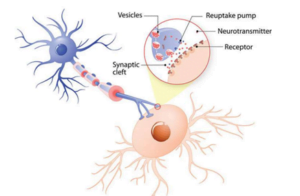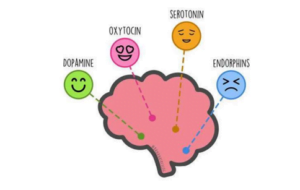From the power of exercise to keeping your gut healthy, we’ve teamed up with experts to discover the benefits of boosting your ‘happy hormones’
Let’s face it, a great mood has the ability to transform our day for the better. Yet sometimes our own cheerfulness can feel rather elusive or beyond our control. Wellbeing experts, Mind It, have shared with us a handful of simple and natural ways that we can try to increase our ‘happy hormones’!
The ability to boost these hormones is a valuable form of self-care. In this blog Mind It delve into the science behind happy hormones and share top tips and tricks on how best to nurture yours.
Is there such a thing as ‘happy hormones’?
Yes, there really is! There are four neurotransmitters involved in mood regulation. According to Mind It, we can consciously engage in activities which increase these neurotransmitter levels. If we plan different ‘chemical boosts’ into our week, these uplifts in mood can contribute towards maintaining our overall wellbeing.
Before we get started, it’s important to know the basics. It all starts with neurotransmitters, which Medical News Today define as the “chemical messengers in the body”. Neurotransmitters carry signals all over our bodies, enabling us to function. Breathing? Digestion? Memory? Movement? Mood? Yep, those are all regulated by neurotransmitters!

The following hormones can be described as ‘happy hormones’:
- Serotonin
- Oxytocin
- Endorphins
- Dopamine

1) Serotonin
Serotonin has been studied in great depth over the years and plenty of research has indicated that increased serotonin levels are related to a more positive mood.
This hormone helps us to balance our mood and is often referred to as the ‘body’s anti-depressant’. Not only can it help with digestion, but also sleep quality.
Forbes writes that deficiencies in serotonin can be linked to certain mood disorders including sleep disorders and depression. That’s why it can be beneficial to introduce useful habits that help to boost our serotonin naturally, such as:
- Sunlight or light therapy. As we all know, sunshine isn’t always easy to come by in England! However, even a bright day can have positive effects so try to get outside as much as you possibly can.
- Meditation and mindfulness. Try to keep your stressors to a minimum with meditation and mindfulness. There are plenty of amazing apps to help you with this, such as CALM and Headspace.
- Regular aerobic exercise. Exercise has many positive effects on the body and boosting your serotonin is one of them. Just 15 minutes of brisk walking a day can make a difference!
- Healthy gut. Fun fact: most of your serotonin is found in your gut. Be sure to take good care of your gut health with plenty of high fibre and prebiotic foods like Greek yoghurt, kimchi and kefir.
- ‘Tryptophan’ foods. This essential amino acid is found in eggs, cheese, turkey, salmon, nuts, seeds, soy foods, tofu and pineapple.
2) Oxytocin
Oxytocin is a vital hormone when it comes to human behaviours such as bonding, trust, empathy and generosity. Increased levels of oxytocin can leave you feeling ‘warm and fuzzy’. Happiness & Health: The Biological Factors say oxytocin “can be a mechanism that produces happiness through facilitating social relations”.
In terms of boosting this lovely hormone, here are some simple day-to-day actions you can try:
- Physical affection. Sharing a hug or holding hands can release oxytocin – another reason to reach out to those you care about.
- Social groups. Coming together over a shared interest can really help to boost your mood. Think about your hobbies and see if there are any local groups you can join.
- Pet an animal. That’s right, petting your furry friend is scientifically proven to help you feel happier – you’re welcome!
- Romantic gestures. As cheesy as it sounds, romance definitely isn’t dead! Thoughtful gestures can go a long way in boosting your mood.
- Compliments. We all know how lovely it can feel to receive a compliment from a friend or even a stranger. Surround yourself with the people that make you feel good!
3) Endorphins
Endorphins can boost our happiness, produce feelings of euphoria and help us to manage feelings of stress. Increased levels have even been shown to inhibit pain in the body.
They sound pretty great, right? So where exactly can we get these happy hormones from? If you’re wanting to boost your endorphins, try the below:
- Exercise. We’ve all heard it before, but it’s true: exercise increases the release of endorphins!
- Dark chocolate/spicy food. Try eating dark chocolate and spicy food every so often. You might just find it works for you.
- Acupuncture/acupressure. It may not be for everyone, but these practices can help to release those much-needed endorphins.
- Massage. Relaxation can be key for releasing endorphins and a massage is a great way to bliss out.
- Social laughter. Yes, laughter really can help to improve our mood. And let’s be honest, who doesn’t love a good laugh with friends?
4) Dopamine
Dopamine is an essential hormone in reward, pleasure, motivation, reinforcement and addiction. When we boost this hormone, it can leave us feeling more focused, alert and proud. There are a variety of ways to naturally boost dopamine:
- Celebrate achievements. Resist the temptation to breeze over your achievements. It’s important that we take the time to celebrate ourselves and others – both professionally and socially.
- Hobbies. Taking a break from the usual day-to-day stresses can have a huge impact on your happiness. Make sure to include some time in your day to do something you enjoy.
- Tasty food. Rejoice – eating our favourite foods can genuinely help our wellbeing! Whether it’s a whopping great curry or your chosen bar of chocolate, it pays to treat yourself once in a while.
- Successful social interactions. Have you ever felt a buzz after having a great conversation with someone? Well, now you know why that could be.
What’s next?
Using the top tips from Mind It above, try to set yourself an action plan for boosting your happy hormones:
- What are you going to do differently going forward?
- Think about the benefits you will get from these actions
- When will you commit?
- How will you hold yourself accountable
Thank you to Mind It for their expertise and contribution to this blog post.
If you’d like to join our next wellbeing webinar, on the science behind motivation and how to re-energise your approach to goal setting, then click here.


